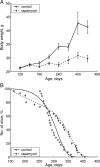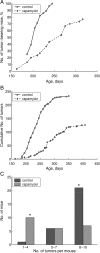Rapamycin extends maximal lifespan in cancer-prone mice
- PMID: 20363920
- PMCID: PMC2861075
- DOI: 10.2353/ajpath.2010.091050
Rapamycin extends maximal lifespan in cancer-prone mice
Abstract
Aging is associated with obesity and cancer. Calorie restriction both slows down aging and delays cancer. Evidence has emerged that the nutrient-sensing mammalian target of rapamycin (mTOR) pathway is involved in cellular and organismal aging. Here we show that the mTOR inhibitor rapamycin prevents age-related weight gain, decreases rate of aging, increases lifespan, and suppresses carcinogenesis in transgenic HER-2/neu cancer-prone mice. Rapamycin dramatically delayed tumor onset as well as decreased the number of tumors per animal and tumor size. We suggest that, by slowing down organismal aging, rapamycin delays cancer.
Figures


References
-
- Guarente L, Kenyon C. Genetic pathways that regulate ageing in model organisms. Nature. 2000;408:255–262. - PubMed
-
- Demidenko ZN, Blagosklonny MV. Growth stimulation leads to cellular senescence when the cell cycle is blocked. Cell Cycle. 2008;7:3355–3361. - PubMed
-
- Vellai T, Takacs-Vellai K, Zhang Y, Kovacs AL, Orosz L, Muller F. Genetics: influence of TOR kinase on lifespan in C. elegans. Nature. 2003;426:620. - PubMed
-
- Jia K, Chen D, Riddle DL. The TOR pathway interacts with the insulin signaling pathway to regulate C. elegans larval development, metabolism and life span. Development. 2004;131:3897–3906. - PubMed
Publication types
MeSH terms
Substances
Grants and funding
LinkOut - more resources
Full Text Sources
Other Literature Sources
Molecular Biology Databases
Research Materials
Miscellaneous

